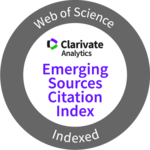About the Journal
Focus & Scope
Estudios de Historia de España is published every six months online by the Instituto de Historia de España of the Universidad Católica Argentina. Its editors aim to disseminate the knowledge developed in the field of Hispanism, through the collaboration of colleagues from Spain and abroad, thus fostering the growth of the discipline and a fruitful exchange between specialists.
Our area of reference is Spanish history and culture in its different chronological periods and in the different aspects of human development: political, social, economic, religious, artistic, etc. The issues are published in the months oh July and December of each year.
Estudios de Historia de España publishes articles, reviews and monographs mainly in Spanish, although it also accepts and publishes works in English, Portuguese, Italian and French.
Peer Review Process
Please note that in the peer review procedure, in order to ensure a correct evaluation, neither the author nor the reviewer will be identified, and the dates corresponding to the receipt and acceptance of the paper will be established.
Each paper will be reviewed according to the "Double Blind" system, by academic peers of recognised experience in the thematic area of the journal, belonging to national and international scientific circles, and external to the publication and its academic environment.
The Management, the members of the Editorial Board and the Advisory Board will analyse all the contributions. The Management reserves the right to determine the issue of the journal in which positively evaluated papers are to be published. The Journal's Management may reject an article, without the need to evaluate it, if it considers that it does not conform to the rules or does not fit the content profile of the journal.
Author/s will be informed of the acceptance or rejection of his/her contribution within a maximum period of six months.
Each paper will be evaluated by two academic peers. In case of controversy in the evaluation, it will be submitted to a third referee.
Author/s will be informed of the results of the evaluations, as well as of the observers' assessments or recommendations.
Open Access Policy
This journal adheres to the philosophy of open access to scientific literature, allowing unrestricted downloading, distribution, copying and printing of its material, thus ensuring the fulfilment of two fundamental objectives:
- Unrestricted access to information, without economic, legal or technical barriers.
- Increased visibility and impact of the institution and its researchers.
A policy of free access is maintained, with no charge for the publication of articles.
Indexing
This journal is indexed in:
- Núcleo Básico de Revistas Científicas Argentinas
- Scopus
- Scielo
- Emerging Sources Citation Index
- Latindex Catálogo 2.0
- ERIH Plus
- DOAJ
- AmeliCA
- REDIB
- Index Islamicus
- MIAR
- International Medieval Bibliography
- Dialnet
- Fondazione Istituto Internazionale di Storia Economica "F. Datini"
- Fuente Académica Premier (EBSCO)
- Fuente Académica Plus (EBSCO)
- Asociación Hispánica de Literatura Medieval
- Regesta Imperii
- REBIUN
- Repertorio de Medievalismo Hispano
- BINPAR - Bibliografia Nacional de Publicaciones Períodicas Argentinas Registradas
- LatinRev
- Malena
- WorldCat
- ROAD - Directory of Open Access Schorlarly Resources
- Mir@bel
- Sign@l
- Latinoamericana Revistas
- EuroPub
- Sherpa Romeo
- BASE
- Scimago Journal & Country Rank
- Sudoc
- Wikidata
- CAPES
- AURA
- Cite Factor
- OAJI - Open Academic Journals Index
- Repositorio Institucional de la Pontificia Universidad Católica Argentina
Submission of articles free of charge (APC)
Estudios de Historia de España does not charge authors any fee for the submission of articles.
Plagiarism detection policy
Estudios de Historia de España's plagiarism control procedure involves the following measures:
In the instructions to authors, the requirement of originality of the submitted papers is manifest.
At the same time, the submission of unpublished works is an exclusive requirement for the acceptance of originals.
Authors are also required to explicitly mention sources in all citations, in accordance with the journal's rules.
Once received, papers are checked by Turnitin's anti-plagiarism software iThenticate.
If any trace of plagiarism or self-plagiarism is detected, articles will be rejected and the author will be notified.
Code of conduct and good practices
Estudios de Historia de España suscribes to the Code of Conduct and Best Practices established by the Committee on Publication Ethics (COPE). In accordance with this Code, editors are responsible for all content published in their journal and, therefore, undertake to:
Strive to meet the needs of their readers and authors.
Strive for continuous improvement of the journal.
Have processes in place to ensure the quality of the material they publish.
Uphold freedom of expression.
Maintain the scholarly integrity of published content.
Prevent commercial issues from compromising intellectual and ethical standards.
Publish corrections, clarifications, retractions and apologies when necessary.
Interoperability protocol
This journal uses the OAI-PMH protocol for metadata harvesting.
http://erevistas.uca.edu.ar/index.php/EHE/oai
History
Estudios de Historia de España es una revista científica editada por el Instituto de Historia de España, fundado por la Dra. María del Carmen Carlé en el año 1987 constituyéndose en el instituto más antiguo y de mayor trayectoria de la Carrera de Historia de la Universidad Católica Argentina.
Preservación Digital
PKP Preservation Network
Journal content is preserved by the PKP Preservation Network (PKP PN) which provides free digital preservation services for journals hosted on Open Journal Systems (OJS) through the LOCKSS program.
LOCKS & CLOCKS
The articles are archived in LOCKSS (Lots of Copies Keep Stuff Safe) and CLOCKSS (Controlled Lots of Copies Keep Stuff Safe), through its integration with OJS, ensuring a permanent and secure archive.
LOCKSS and CLOKSS guarantee digital preservation in a decentralized and distributed manner, and ensure long-term access to published content.
See LOCKSS Manifest | See CLOCKSS Manifest
Institutional Repository
Estudios de Historia de España's articles are deposited in the Institutional Repository of the Pontificia Universidad Católica Argentina ensuring that the integrity of the archived content is verified. Additionally, it is backed up to a master preservation folder at the institution.
DOI (Digital Object Identifier)
This journal uses DOI as a persistent identifier, managed in Crossref, which prevents loss of access to the content if the journal's URL is modified in the future.
Journal DOI: https://doi.org/10.46553/ehe





























 Estudios de Historia de España
Estudios de Historia de España